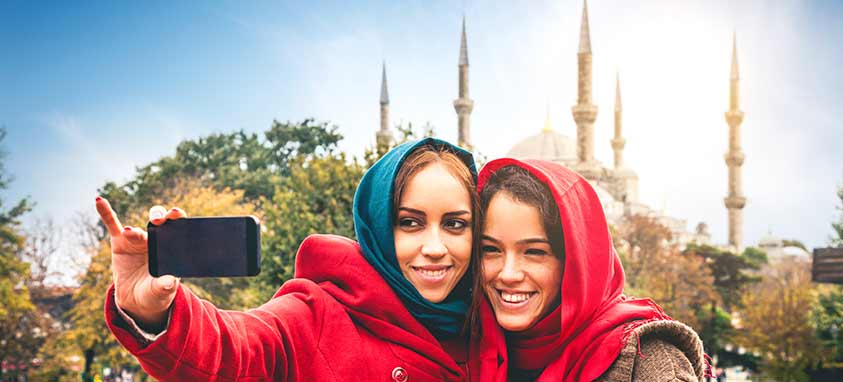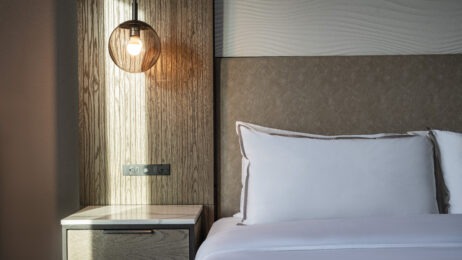Muslim travelers top global tourism spending
Travel industry leaders and hotel operators are keeping their fingers on the pulse of an unexpected yet rapidly growing market that is at the forefront of global tourism spending. Muslim travelers are the biggest spenders when it comes to international travel, according to a study from MasterCard and Crescent Rating that estimates their spending at more than $140 billion in 2014.
A report on the global Islamic economy released by Thomson Reuters and DinarStandard puts the halal travel sector’s worth at $137 billion in 2013. That year, Muslim countries whose travelers spent the most overseas were Saudi Arabia ($17.8 billion), Iran ($14.3 billion), United Arab Emirates ($11.2 billion) and Qatar ($7.8 billion). Altogether, Muslim travelers represent at least 12 percent of global expenditures in the leisure travel market.
In response to the data, the hospitality industry is coming together to learn how it can cater to this niche market and embrace the halal lifestyle. Last year, the first Halal Tourism Conference was held in Andalusia, Spain—a favorite destination among halal travelers for its Moorish history and architecture. Around 400 delegates from tourism boards, tourism agencies, tour operators, restaurants, media, hotels and airlines attended the conference.
Japan also held its own conference last year. The Japan Halal Expo gathered delegates interested in addressing the needs of Muslim visitors in anticipation of the 2020 Olympics, to be held in Tokyo. Japanese airports are in the process of adding prayer rooms and halal restaurants. Visa requirements in the Asian country are more relaxed for travelers from Malaysia and Indonesia.
Orange County Celebrates Eid al-Fitr
In the United States, Orange County Visitors Association (OCVA) is going the extra mile for Middle Eastern tourists looking to travel during the end of the Ramadan holiday. In July, the tourism association released a free online training video that encourages its 700 members to be more culturally aware and sensitive to Middle Eastern customs. The video coincides with Eid al-Fitr, which marked the end of a 30-day period of fasting and worship on July 17. Many Muslims celebrate the holiday with an equally long vacation, lasting on average 30–45 days.
“We hope businesses use this to train staff to encourage culturally aware hospitality for our Middle Eastern tourists,” says OCVA CEO Ed Fuller. “We are making sure our friends in the Middle East feel comfortable by culturally providing for their needs so they are motivated to return to Orange County year after year.”
In 2013, the United States welcomed more than 1 million Middle Eastern tourists, including many who traveled to Southern California. OCVA says Orange County’s high-end attractions and amenities make it a popular destination for Muslim travelers. Luxury resorts, high-end restaurants and upscale shopping complexes, in particular, are a big draw for the travel segment.
Lifted Sanctions in Iran Means More Hotels
Doors could also open between hotel operators and the Muslim world through an unforeseen entry point. As the Iran Nuclear agreement heads to Congress after receiving approval from the U.N. Security Council, hotel groups are anticipating new avenues for business and tourism. Brands such as Marriott, AccorHotels and Hospitality Management Holdings (HMH) are awaiting news of lifted sanctions in Iran to open more hotels in an under-supplied market.
Hotelier Middle East reports that in recent years, hotel operators have been dissuaded from extending their brands in Iran due to negative media coverage. Before the Islamic Revolution in 1979, international brands such as Starwood, Hilton, Hyatt and InterContinental Hotels Group once operated luxury properties in Tehran.
In the pilgrimage city of Mashhad, Rotana Hotel Management Corporation plans to open a 362-room property in 2017 and a 275-room property in 2018. Two more Tehran hotels, a 194-room five-star property and a 210-room four-star property, are planned for 2018. Rotana recognizes a need for hotels in the Persian nation that has experienced many years of isolation.
Hospitality Management Holdings has a strong tradition of opening properties in the Middle East, and is the first chain to offer alcohol-free and halal-friendly lodgings. The brand has a keen interest in Iran, and is anxiously watching the status of sanctions. Marriott International is also looking forward to renewed relations with Iran and the international community.
HMH CEO Laurent A. Voivenel said, “Halal-friendly is part of the company’s culture and DNA, and not simply a business decision…all brands under HMH are halal-friendly, no matter where we operate.”
For its population of approximately 12 million, Tehran offers only 16 four- and five-star properties among its low inventory of 96 hotels. Comparatively, Dubai next door has more than 650 hotels. However, the number of tourists visiting Iran is increasing. A recent report from TRI Consulting states that 4.8 million tourists arrived in Iran in 2014, a marked increase from 3.1 million visitors in 2010. By 2024, Iran expects 5.2 million visitors.
Muslim citizens have a global population of 1.8 billion across Muslim-majority countries, which include Indonesia, Malaysia, Turkey and Gulf nations. By 2030, Muslims are expected to make up 26.5 percent of the world’s population.




